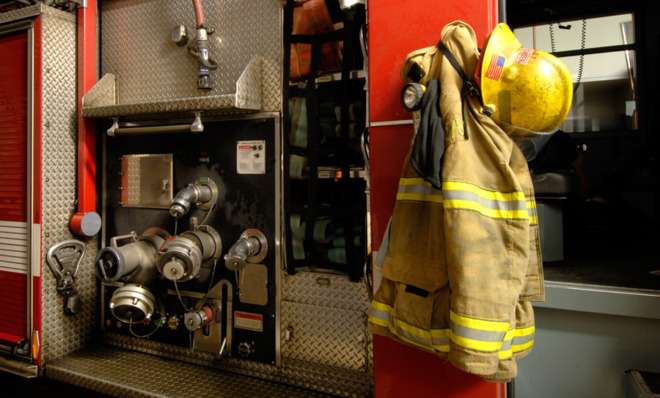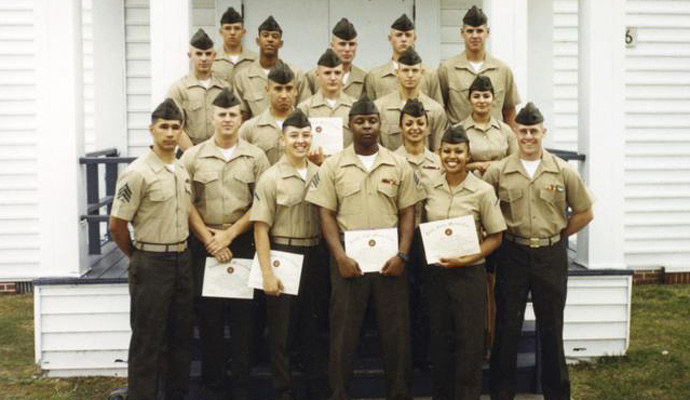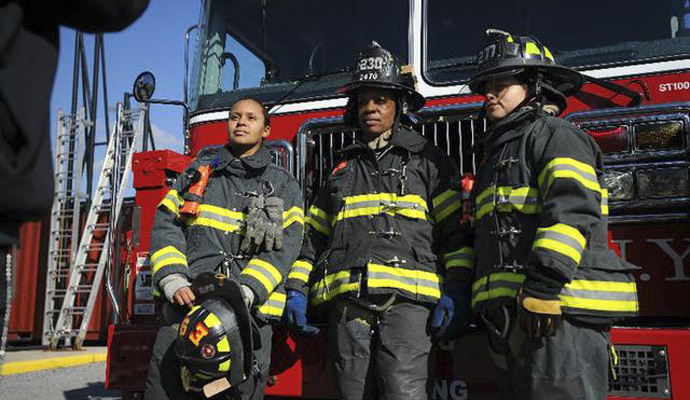The woman who played with fire
Sophy Medina conquered boot camp and mastered the Marine Corps. Now she's breaking into the white- and male-dominated New York City Fire Department.

A free daily email with the biggest news stories of the day – and the best features from TheWeek.com
You are now subscribed
Your newsletter sign-up was successful

June 2008: Night has spilled into morning. Sophy Medina and a friend are coming home from a party, both buzzed and each dressed in one of their more cleavage-bearing outfits. They walk up to the door of Medina's apartment and, while fiddling around with her keys, Medina turns around to face a mugger holding a gun, its nozzle inches away from the right side of her chest, slightly below her collarbone. He asks for her purse. She immediately gives it to him. A second mugger screams at her friend to hand over her valuables; she reaches into her purse and gives him her phone and money. The gun-toting mugger's free hand lightly grazes Medina's inner thigh, hinting that the worst might still be to come.
"At that point I thought, 'Me and this dude are both going to die before that happens,'" Medina says. After four years in the Marine Corps, Medina can hurt someone quite easily, gun or no gun. It's hard to say how she invoked that strength with merely a look, but that was all she needed to do, and the muggers knew to walk away.
Medina detailed her account of the incident to some friends at a New Year's Eve party six months later. Hispanic and around five-foot-two, Medina wore gold heels, chandelier earrings and low-cut, hip-hugging jeans. She weighed in at a healthy 145 pounds — mostly muscle in a diminutive package. She at least hoped it was muscle because she'd gained fifteen pounds since starting the training course required to become a New York City firefighter, shortly after the mugging. Her face has always captivated men and most of her Facebook photos show her wearing dresses that enhance her many curves, exuding a Herculean femininity. Though unhappy with the weight gain, she understood that the extra pounds were a less-than-ideal but necessary symptom of the job — one that would challenge her physical and emotional limits like no other career a former Marine could have possibly chosen.
The Week
Escape your echo chamber. Get the facts behind the news, plus analysis from multiple perspectives.

Sign up for The Week's Free Newsletters
From our morning news briefing to a weekly Good News Newsletter, get the best of The Week delivered directly to your inbox.
From our morning news briefing to a weekly Good News Newsletter, get the best of The Week delivered directly to your inbox.
Medina joined the military after high school to take financial burden off her single mother. Rarely one to back down from a challenge, she decided on the Marines because of its reputation as the most rigorous branch of the military. "If I'm going to do it I'm going to do it," Medina, now thirty-two, says confidently.
(More from Narratively: The Saudi who dared to sing)
She asked her best friend, Meosha Williams, to come with her. The pair met in high school after both girls chose swim class over volleyball, because as one or the other said at the time, "Volleyball can't save your life." They entered the Marines through the Buddy System, a program often employed as a recruiting tool since it guarantees that friends who enlist together go through boot camp together as well. Or, as Williams says, "It's what they use to get you in without you feeling too much pressure."

Williams, now a teacher after completing college funded by the Montgomery GI bill, agreed to accompany Medina because, as she puts it, "I didn't know what I wanted to do after high school, but I just knew it wouldn't be here in the Bronx."
A free daily email with the biggest news stories of the day – and the best features from TheWeek.com
Both women consider basic training a struggle unmatched by anything they had done before and cite each other as the main reason they survived it. Their predilection for having fun together in just about any situation didn't hurt either. While other recruits had their confidence broken by instructors, Medina and Williams often got in trouble for laughing too much. Given their strict upbringing, neither Medina nor Williams considered being yelled at or publicly humiliated particularly grievous. They would even laugh at situations other recruits found completely mortifying. "Girls would cry every day, and we were just happy that we were not getting beaten," Medina says. "She grew up in a household where her mom would beat her if she did something wrong and [so did I]. All [the instructors] would do is scream at us and we were like, 'Pfft, this is great!'"
But there was one instance when they couldn't help but cry, if only for a moment. "The first time we cried was when our birthdays passed by; they are close to one another, and we both didn't get a card," Medina says. "We just looked at each other and I think she went to the bathroom and I went to the laundry room or vice versa. I finally went to look for her. I was so upset and she was so upset. We thought everyone forgot about us. Then we both looked at each other and started laughing."
They each received cards in the coming days.
The Marines separate female recruits during boot camp and each platoon is led by another enlisted woman. "There is no distraction with boys and girls together," Medina says. "And you're taught by a female, which is good because it's not like a man saying 'You can do it' and not showing you that you can do it. It's like 'Yeah, you can do it — I look like you, I'm shaped like you.'" Other than some minor differences, such as slower running requirements for women, the demands for all recruits, regardless of sex, are the same. "I fared well in basic training," Medina says proudly. "The only part that I always have problems with is running. Running sucks and the Marines love running fast. I can trot for days but running all the time, fast, I'm like, 'You guys can keep that.'"
(More from Narratively: Playing by ear)
While often dubbed a sexist culture, ill-equipped to handle gender inequities, Medina found that the Marines celebrate physical grit so much that anyone, male or female, strong enough to graduate from boot camp is considered a bona fide Marine.
Today only six percent of enlisted Marines are females. Medina is no longer one of them. The Marines exhausted her. "They just run you," she says. "You're always doing something, or could be doing something, so they say, 'Why stand when you can sit? Why sit when you can lie down? Why lie down if you can sleep?'"
So she left.
***
It's December 2010 and Medina has the night off; in fact, the next couple of days off. The fire department never sleeps so her work schedule demands unorthodox hours. She receives a text message from someone who works at another firehouse asking if she could take his shift the next day. She agrees to, recognizing the importance of establishing a good rapport with firemen in other houses.

Her friends often say, "Oh my god, you must work around hot guys all the time." But Medina swears she's never been attracted to anyone in her firehouse. "It's also a bit taboo," she says. She pauses, then adds: "And ya' know, they tawk like this: Sophy, how ya' do-win. Hey yo bada bing bada boom." She admits she's exaggerating as she imitates men in her firehouse, the way a sister would a brother, and as though she's been given that right as a member of its tight-knit, devoted community.
(More from Narratively: Tagging the battlefield)
The gentle hazing goes both ways. "You know you're included when they don't censor themselves anymore," Medina says. "When I first got there it'd be like, 'Don't talk like that in front of her.' And now it's like 'Oh, it's Medina, it's cool.'" Typical boys club subjects ranging from poop to sex aren't excluded. "If they are talking about anything sexual," she continues, "I'll just listen but I'm not going to participate in that. If I did, they'd look at me totally different."
Of course, when she entered the Fire Department, it was not only her gender that made her stand out. For many decades, the FDNY has been considered an organization that Irish- and Italian-Americans built, and is still filled with many of those whom Medina has affectionately termed "the O people": O'Sheas, O'Connells and O'Reillys. The department remained ethnically homogenous for so many years that in 2007, minority applicants sued the FDNY for discrimination, and a judge found there was enough evidence to support the claim that recruitment exams discriminated against blacks and Hispanics. As a remedy, the judge ordered that "out of every five entry-level hires, the Fire Department must agree to reserve two hires for black priority applicants and one for a Hispanic priority applicant until 293 qualifying minority candidates have been offered a position." The city successfully appealed the ruling, but new initiatives instituted to increase minority recruitment remain in place.
Read more of this story at Narratively.
Narratively is an online magazine devoted to original, in-depth and untold stories. Each week, Narratively explores a different theme and publishes just one story a day. It was one of TIME's 50 Best Websites of 2013.
-
 Is Andrew’s arrest the end for the monarchy?
Is Andrew’s arrest the end for the monarchy?Today's Big Question The King has distanced the Royal Family from his disgraced brother but a ‘fit of revolutionary disgust’ could still wipe them out
-
 Quiz of The Week: 14 – 20 February
Quiz of The Week: 14 – 20 FebruaryQuiz Have you been paying attention to The Week’s news?
-
 The Week Unwrapped: Do the Freemasons have too much sway in the police force?
The Week Unwrapped: Do the Freemasons have too much sway in the police force?Podcast Plus, what does the growing popularity of prediction markets mean for the future? And why are UK film and TV workers struggling?